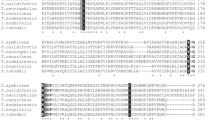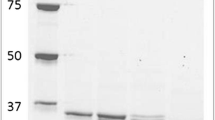Abstract
The hyperthermophilic, sulfate-reducing archaeon Archaeoglobus fulgidus strain 7324 has been shown to degrade starch via glucose using a modified Embden-Meyerhof pathway. In this pathway phosphorylation of fructose-6-phosphate to fructose-1,6 bisphosphate is catalyzed by an ADP-dependent 6-phosphofructokinase (ADP-PFK), which was purified 1,800-fold to homogeneity. The enzyme is composed of 50 kDa subunits and is eluted from gel filtration as both a homotetramer and a homodimer. It had a temperature optimum at 85°C and showed significant thermostability up to 95°C. Kinetic constants were determined for both reaction directions at pH 6.6 and 80°C. Rate dependence for all substrates followed Michaelis Menten kinetics. The apparent K m for ADP and fructose-6-phosphate (forward reaction) was 0.6 mM and 2.2 mM, respectively; the apparent V max was 1,200 U/mg. ADP-PFK catalyzed in vitro the reverse reaction, with apparent K m for fructose-1,6-bisophosphate and AMP of 5.7 and 1.4 mM, respectively, and a V max value of 85 U/mg. The enzyme did not use ATP, PPi, or acetyl phosphate as phosphoryl donor and was highly specific for fructose-6-phosphate as substrate. The A. fulgidus ADP-PFK did not phosphorylate glucose and thus differs from the bifunctional ADP-PFK/GLK from Methanococcus jannaschii. Divalent cations were required for catalytic activity; Mg2+, which was most effective, could be partially replaced by Mn2+, Ni2+, and Co2+. Enzyme activity was not allosterically regulated by classical effectors of bacterial and eukaryal ATP-PFKs, such as ADP, AMP, phosphoenolpyruvate, or citrate. N-terminal amino acid sequence showed high similarity to known ADP-PFKs. In the genome of Archaeoglobus fulgidus strain VC 16, which is closely related to strain 7324, no homologous gene for ADP-PFK could be identified.




Similar content being viewed by others
References
Bateman A, Birney E, Durbin R, Eddy SR, Howe KL, Sonnhammer EL (2001) The Pfam protein families database. Nucleic Acids Res 28:263–266
Beeder J, Nilsen RK, Rosnes JT, Torsvik T, Lien T (1994) Archaeoglobus fulgidus isolated from hot North Sea oil field waters. Appl Environ Microbiol 60:1227–1231
Bradford MM (1976) A rapid and sensitive method for the quantitation of microgram quantities of protein utilizing the principle of protein-dye binding. Anal Biochem 72:248–254
Daldal F (1983) Molecular cloning of the gene for phosphofructokinase-2 of Escherichia coli and the nature of a mutation, pfkB1, causing a high level of the enzyme. J Mol Biol 168:285–305
Hansen T, Schönheit P (2000) Purification and properties of the first-identified, archaeal, ATP-dependent 6-phosphofructokinase, an extremely thermophilic non-allosteric enzyme, from the hyperthermophile Desulfurococcus amylolyticus. Arch Microbiol 173:103–109
Hansen T, Schönheit P (2001) Sequence, expression, and characterization of the first archaeal ATP-dependent 6-phosphofructokinase, a non-allosteric enzyme related to the phosphofructokinase-B sugar kinase family, from the hyperthermophilic crenarchaeote Aeropyrum pernix. Arch Microbiol 177:62–69
Hansen T, Musfeldt M, Schönheit P (2002a) ATP-dependent 6-phosphofructokinase from the hyperthermophilic bacterium Thermotoga maritima: characterization of an extremely thermophilic, allosterically regulated enzyme. Arch Microbiol 177:401–409
Hansen T, Schlichting B, Schönheit P (2002b) Glucose-6-phosphate dehydrogenase from the hyperthermophilic bacterium Thermotoga maritima: expression of the g6pd gene and characterization of an extremely thermophilic enzyme. FEMS Microbiol Lett 216:249–253
Ito S, Fushinobu S, Yoshioka I, Koga S, Matsuzawa H, Wakagi T (2001) Structural basis for the ADP-specificity of a novel glucokinase from a hyperthermophilic archaeon. Structure (Camb) 9:205–214
Kengen SW, Tuininga JE, de Bok FA, Stams AJ, De Vos WM (1995) Purification and characterization of a novel ADP-dependent glucokinase from the hyperthermophilic archaeon Pyrococcus furiosus. J Biol Chem 270:30453–30457
Klenk HP et al. (1997) The complete genome sequence of the hyperthermophilic, sulphate- reducing archaeon Archaeoglobus fulgidus. Nature 390:364–370
Koga S, Yoshioka I, Sakuraba H, Takahashi M, Sakasegawa S, Shimizu S, Ohshima T (2000) Biochemical characterization, cloning, and sequencing of ADP-dependent (AMP-forming) glucokinase from two hyperthermophilic archaea, Pyrococcus furiosus and Thermococcus litoralis. J Biochem (Tokyo) 128:1079–1085
Labes A, Schönheit P (2001) Sugar utilization in the hyperthermophilic, sulfate-reducing archaeon Archaeoglobus fulgidus strain 7324: starch degradation to acetate and CO2 via a modified Embden-Meyerhof pathway and acetyl-CoA synthetase (ADP-forming). Arch Microbiol 176:329–338
Laemmli UK (1970) Cleavage of structural proteins during the assembly of the head of bacteriophage T4. Nature 227:680–685
Meyer C, Schmid R, Scriba PC, Wehling M (1996) Purification and partial sequencing of high-affinity progesterone- binding site(s) from porcine liver membranes. Eur J Biochem 239:726–731
Ronimus RS, Morgan HW (2001) The biochemical properties and phylogenies of phosphofructokinases from extremophiles. Extremophiles 5:357–373
Ronimus RS, Koning J, Morgan HW (1999) Purification and characterization of an ADP-dependent phosphofructokinase from Thermococcus zilligii. Extremophiles 3:121–129
Ronimus RS, de Heus E, Morgan HW (2001) Sequencing, expression, characterisation and phylogeny of the ADP-dependent phosphofructokinase from the hyperthermophilic, euryarchaeal Thermococcus zilligii. Biochim Biophys Acta 1517:384–391
Sakuraba H, et al (2002) ADP-dependent glucokinase/phosphofructokinase, a novel bifunctional enzyme from the hyperthermophilic archaeon Methanococcus jannaschii. J Biol Chem 277:12495–12498
Selig M, Xavier KB, Santos H, Schönheit P (1997) Comparative analysis of Embden-Meyerhof and Entner-Doudoroff glycolytic pathways in hyperthermophilic archaea and the bacterium Thermotoga. Arch Microbiol 167:217–232
Siebers B, Klenk HP, Hensel R (1998) PPi-dependent phosphofructokinase from Thermoproteus tenax, an archaeal descendant of an ancient line in phosphofructokinase evolution. J Bacteriol 180:2137–2143
Stetter KO (1996) Hyperthermophilic procaryotes. FEMS Microbiol Rev 18:149–158
Tsuge H, Sakuraba H, Kobe T, Kujime A, Katunuma N, Ohshima T (2002) Crystal structure of the ADP-dependent glucokinase from Pyrococcus horikoshii at 2.0-A resolution: A large conformational change in ADP-dependent glucokinase. Protein Sci 11:2456–2463
Tuininga JE, Verhees CH, Van der Oost J, Kengen SW, Stams AJ, De Vos WM (1999) Molecular and biochemical characterization of the ADP-dependent phosphofructokinase from the hyperthermophilic archaeon Pyrococcus furiosus. J Biol Chem 274:21023–21028
Uyeda K (1979) Phosphofructokinases. Adv Enzymol 48:193–244
Verhees CH, Tuininga JE, Kengen SW, Stams AJ, van der OJ, De Vos WM (2001) ADP-dependent phosphofructokinases in mesophilic and thermophilic methanogenic archaea. J Bacteriol 183:7145–7153
Acknowledgements
The authors thank Dr. R. Schmid (Mikrobiologie, Universität Osnabrück) for N-terminal amino acid sequencing and H. Preidel for mass culturing Archaeoglobus fulgidus strain 7324. Some preliminary experiments of the purification and characterization of A. fulgidus ADP-PFK were carried out by Bettina Schlichting in an advanced student course. This work was supported by grants from the Deutsche Forschungsgemeinschaft (SCHO 316/8–1) and the Fonds der Chemischen Industrie.
Author information
Authors and Affiliations
Corresponding author
Additional information
Communicated by G. Antranikian
Rights and permissions
About this article
Cite this article
Hansen, T., Schönheit, P. ADP-dependent 6-phosphofructokinase, an extremely thermophilic, non-allosteric enzyme from the hyperthermophilic, sulfate-reducing archaeon Archaeoglobus fulgidus strain 7324. Extremophiles 8, 29–35 (2004). https://doi.org/10.1007/s00792-003-0356-1
Received:
Accepted:
Published:
Issue Date:
DOI: https://doi.org/10.1007/s00792-003-0356-1




